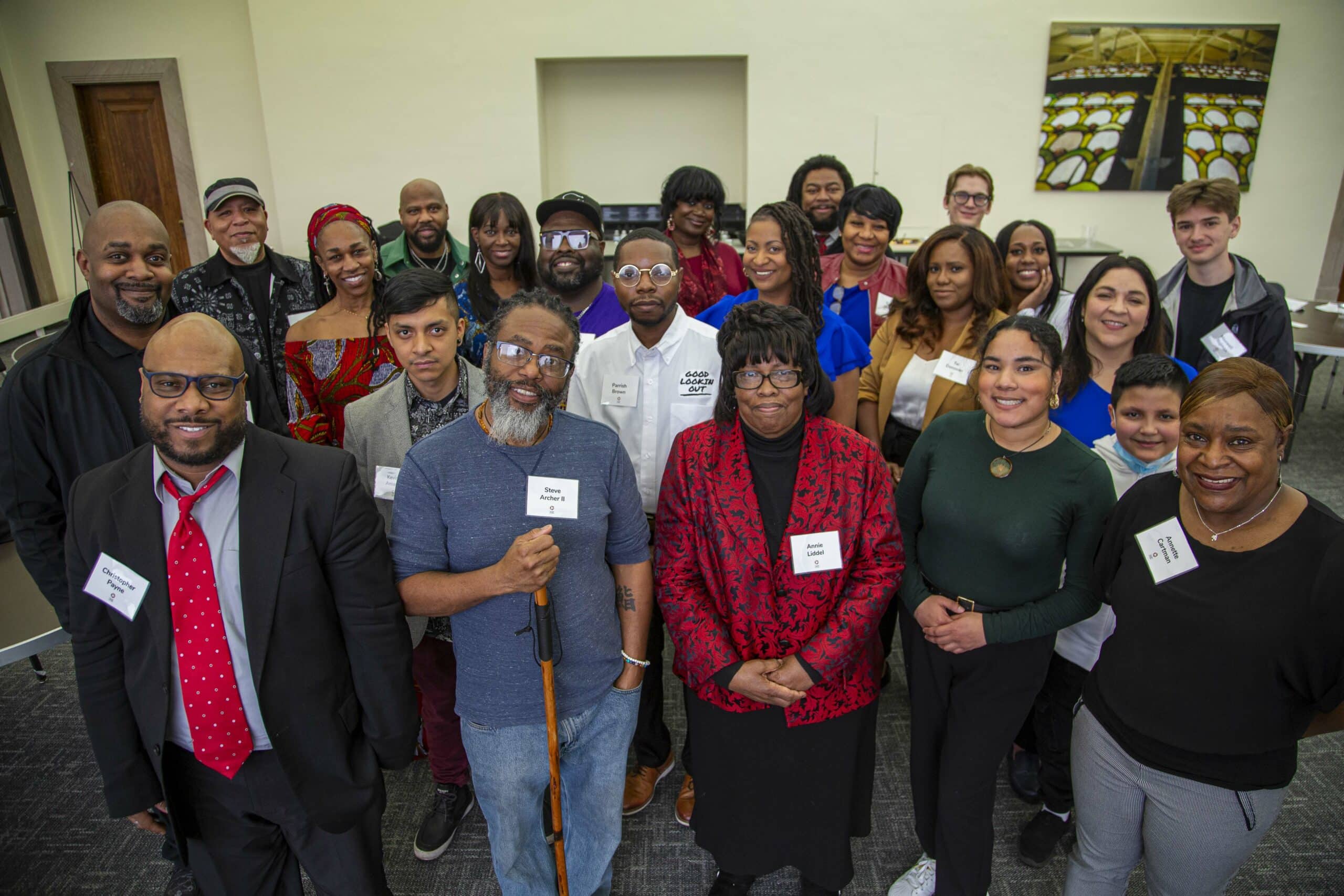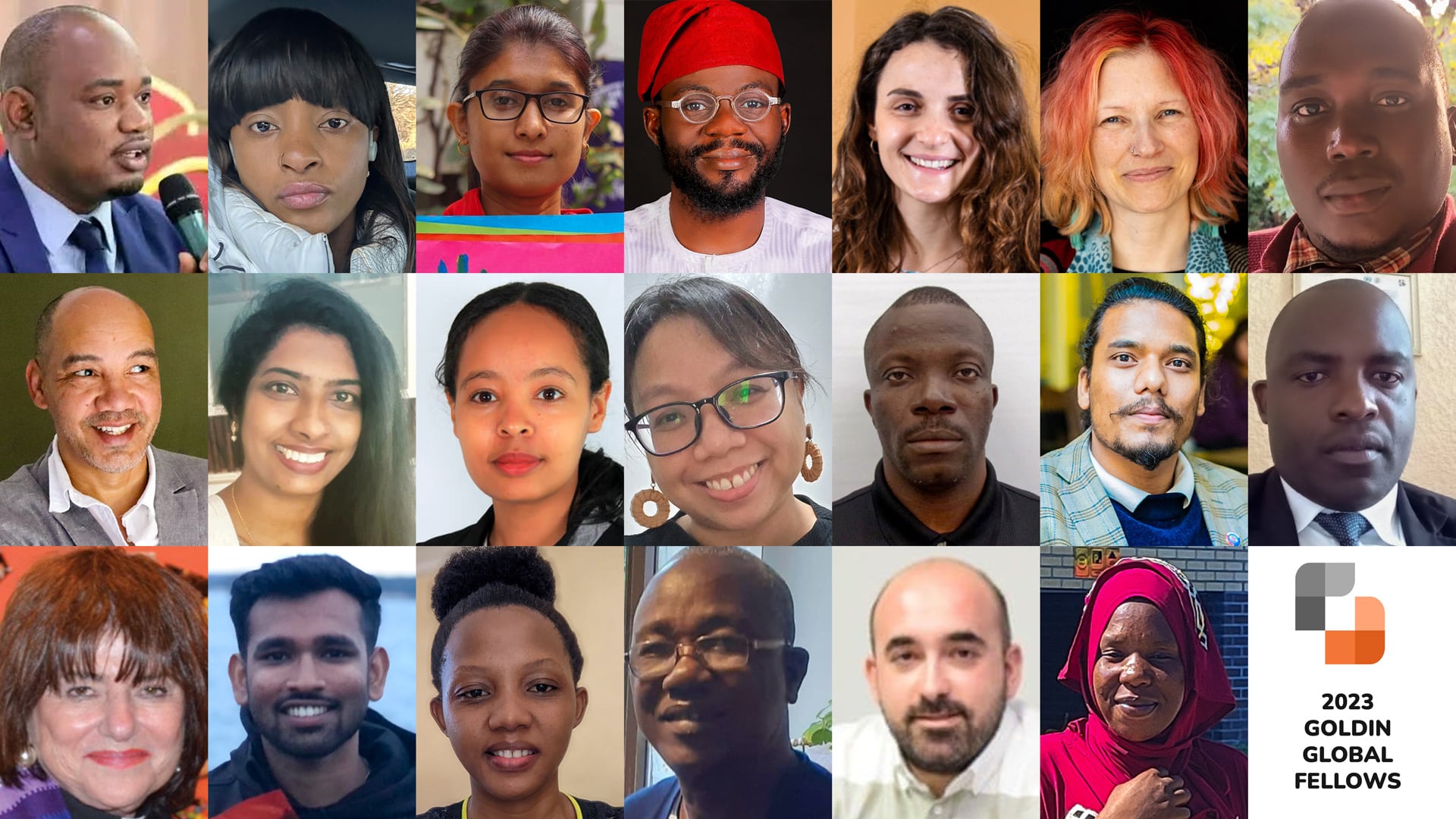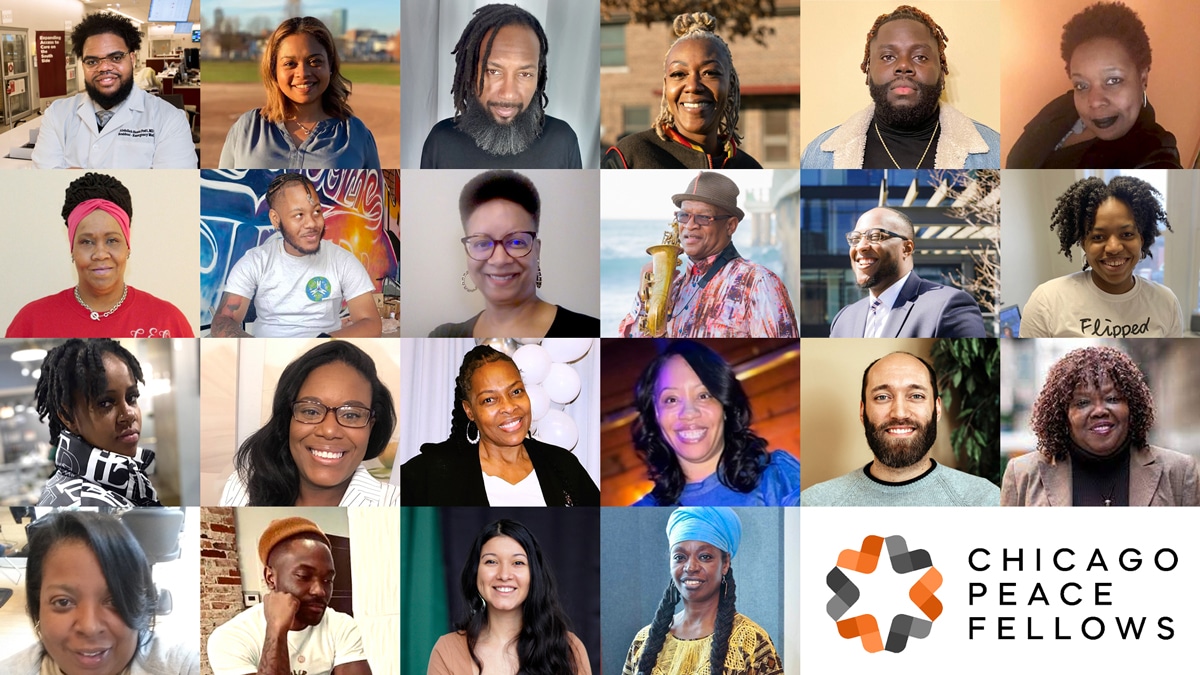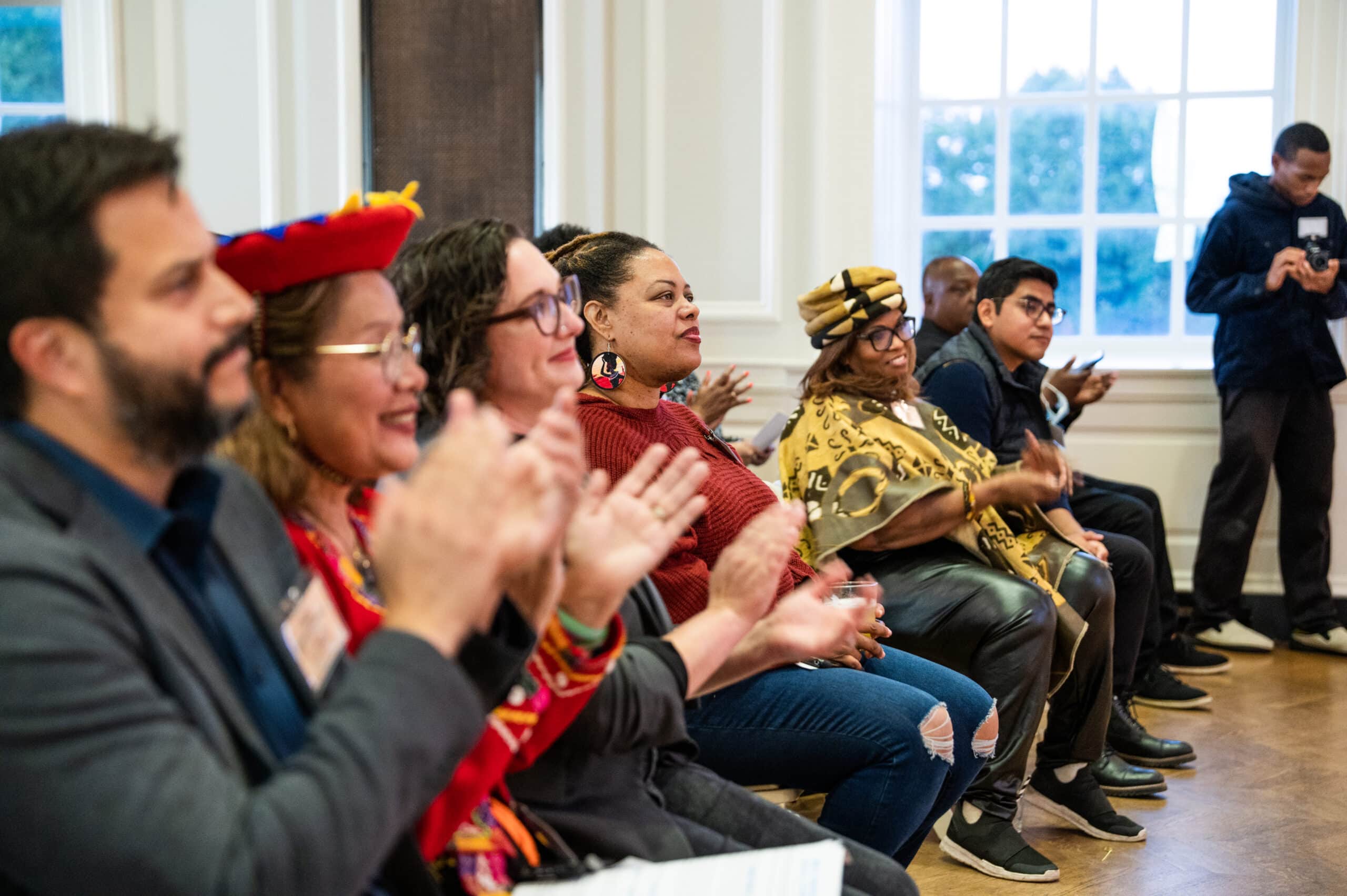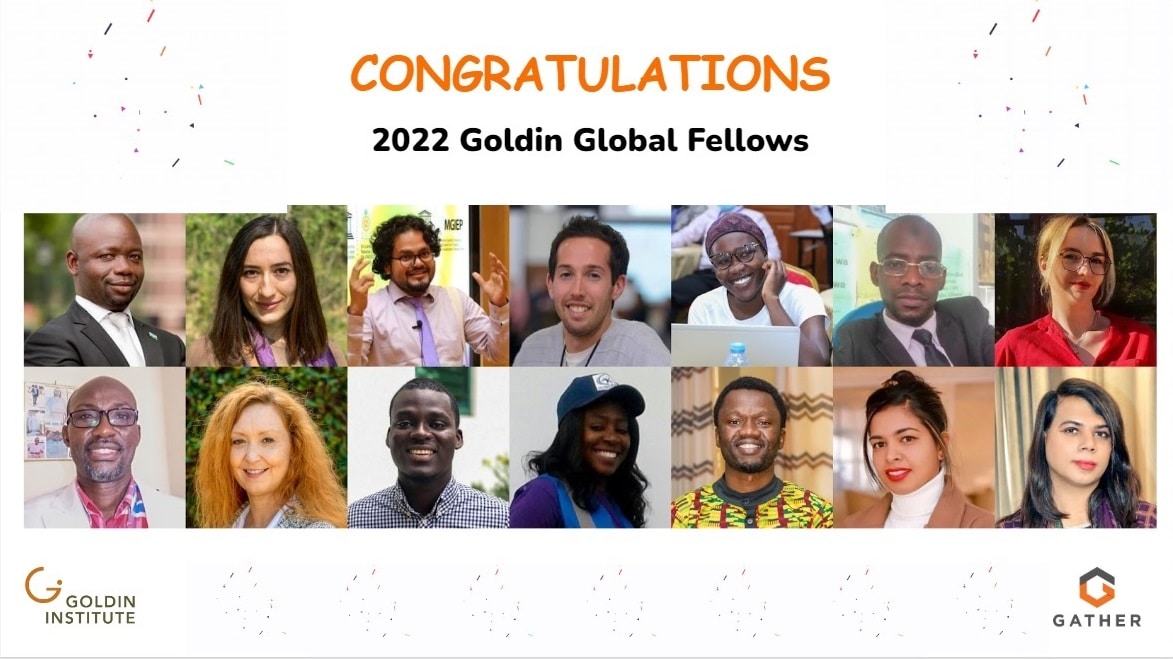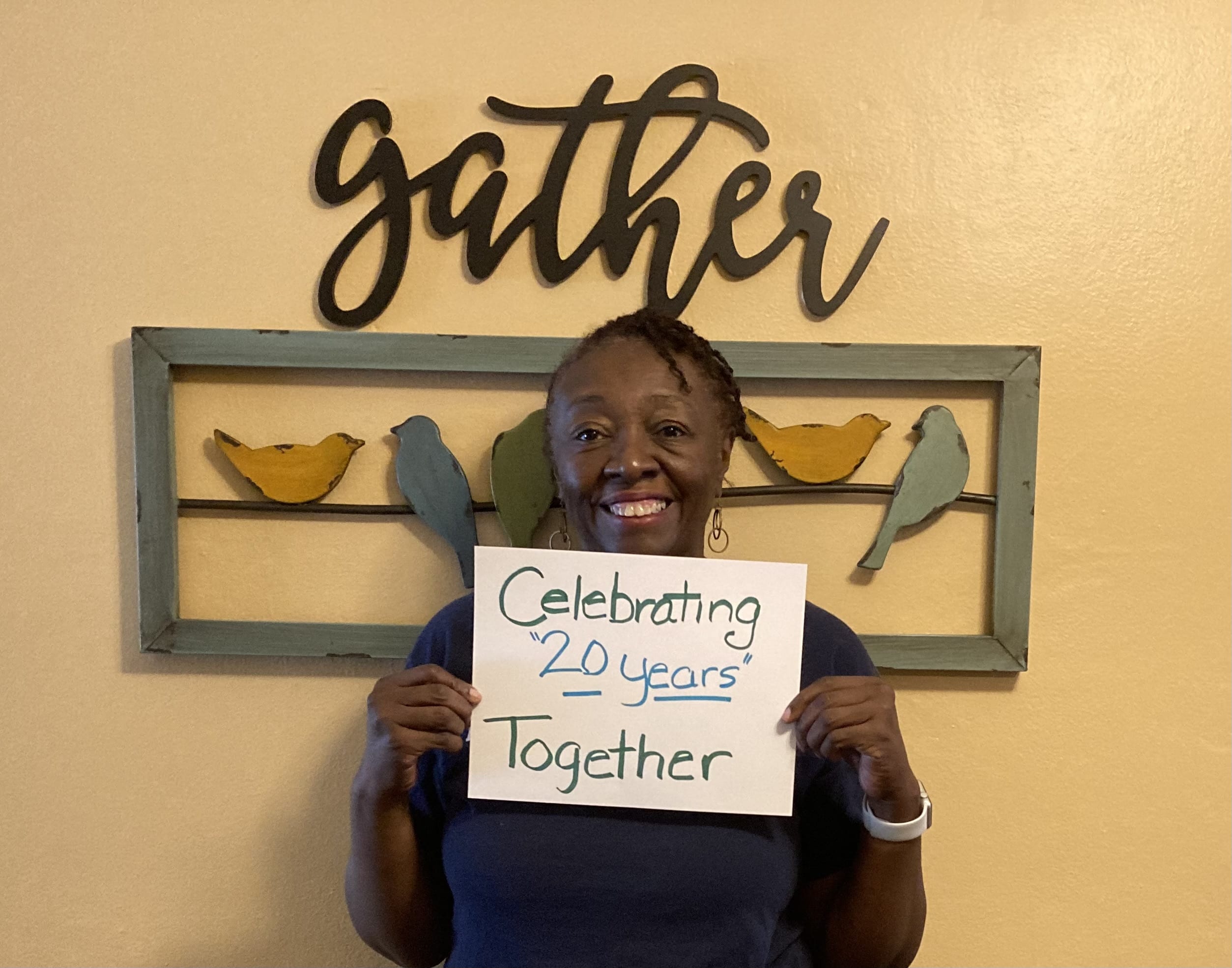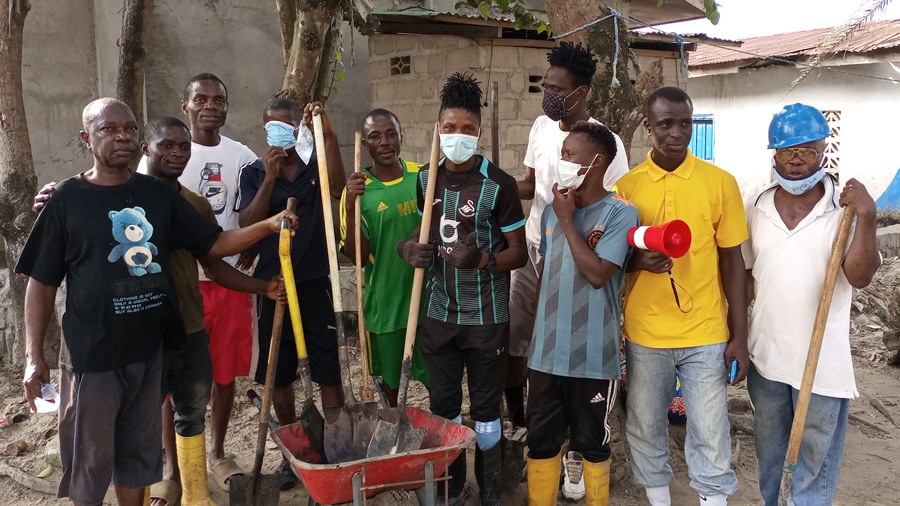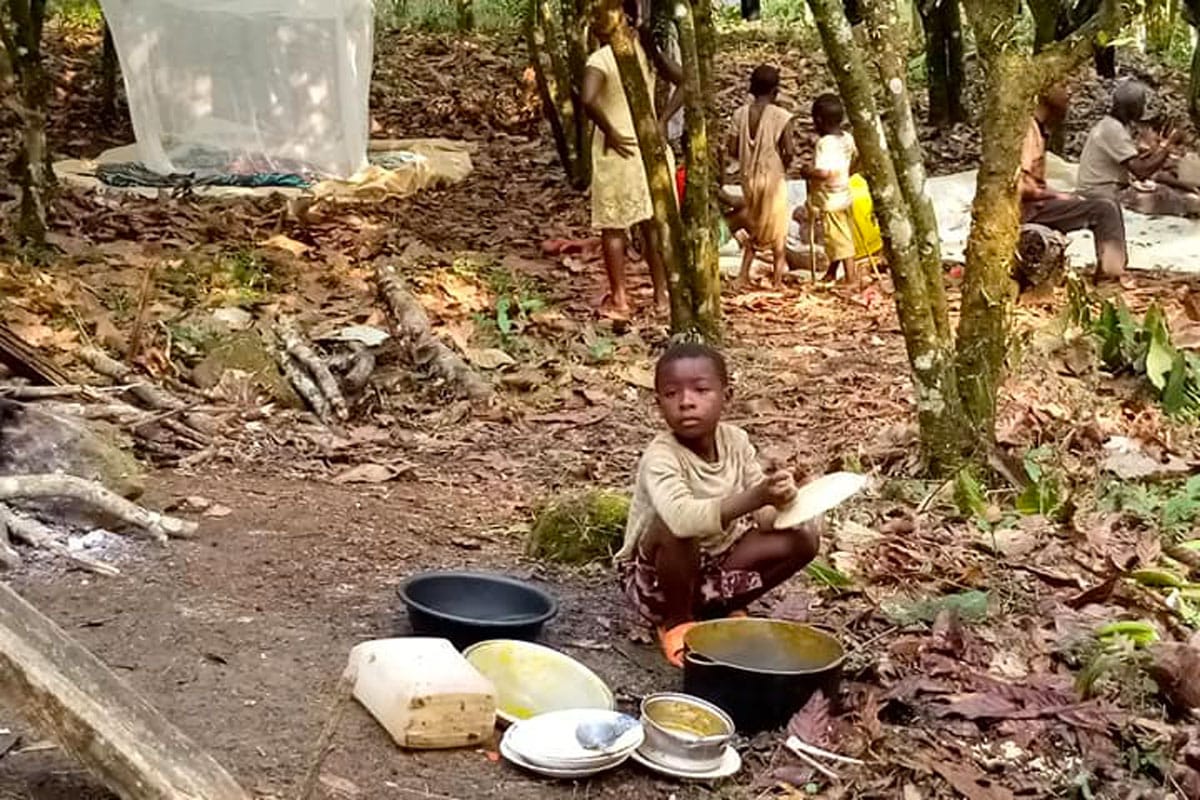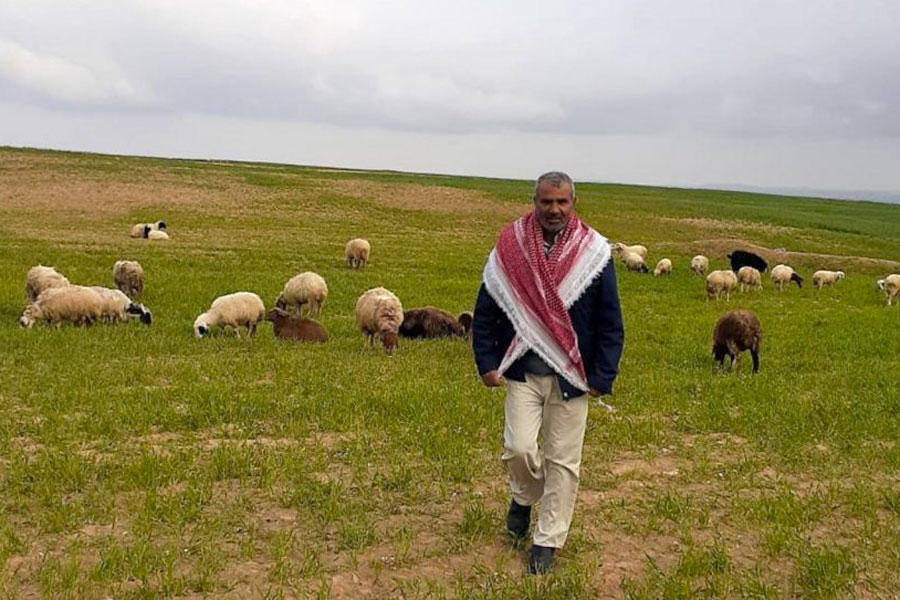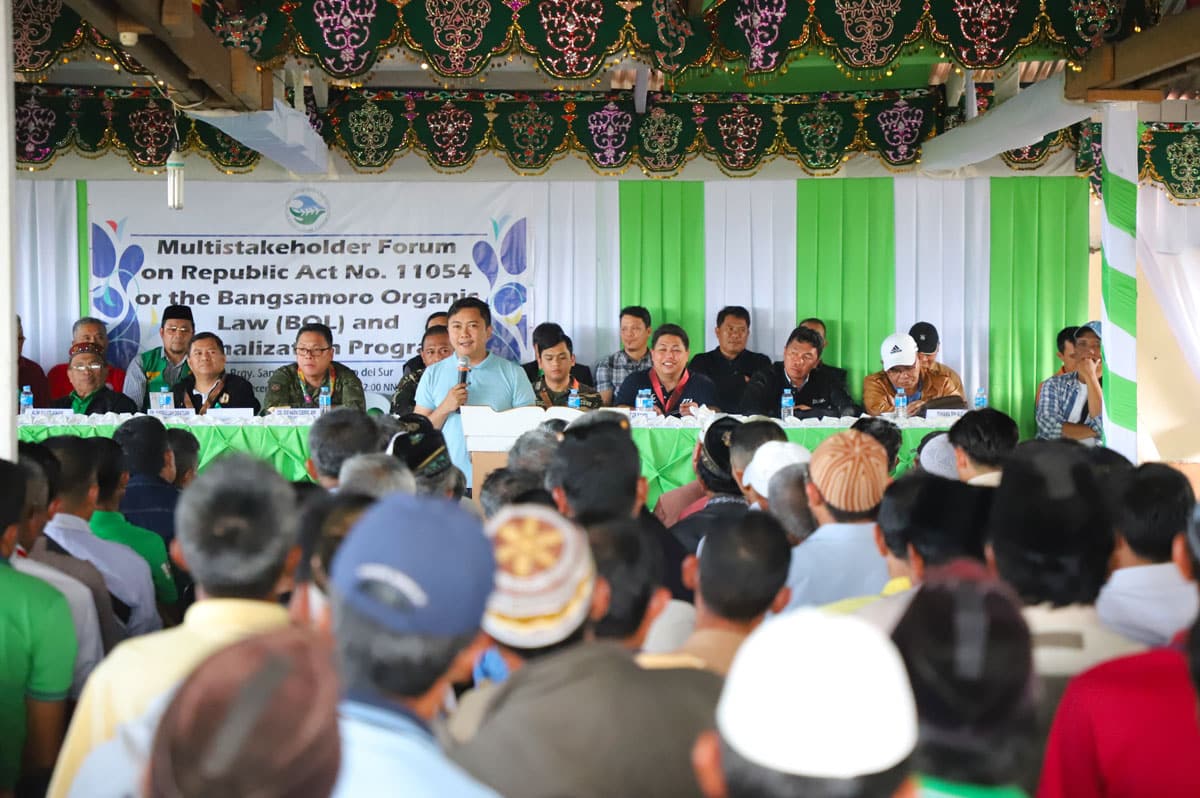Meet the 2024 Chicago Peace Fellows
The Goldin Institute invites you to learn about each of our 2024 Chicago Peace Fellows representing 14 community areas across the city. Founded in 2019 in collaboration with the Partnership for Safe and Peaceful Communities, the Chicago Peace Fellows program is the only leadership development program that is built by and for grassroots community leaders on the South and West sides of Chicago.
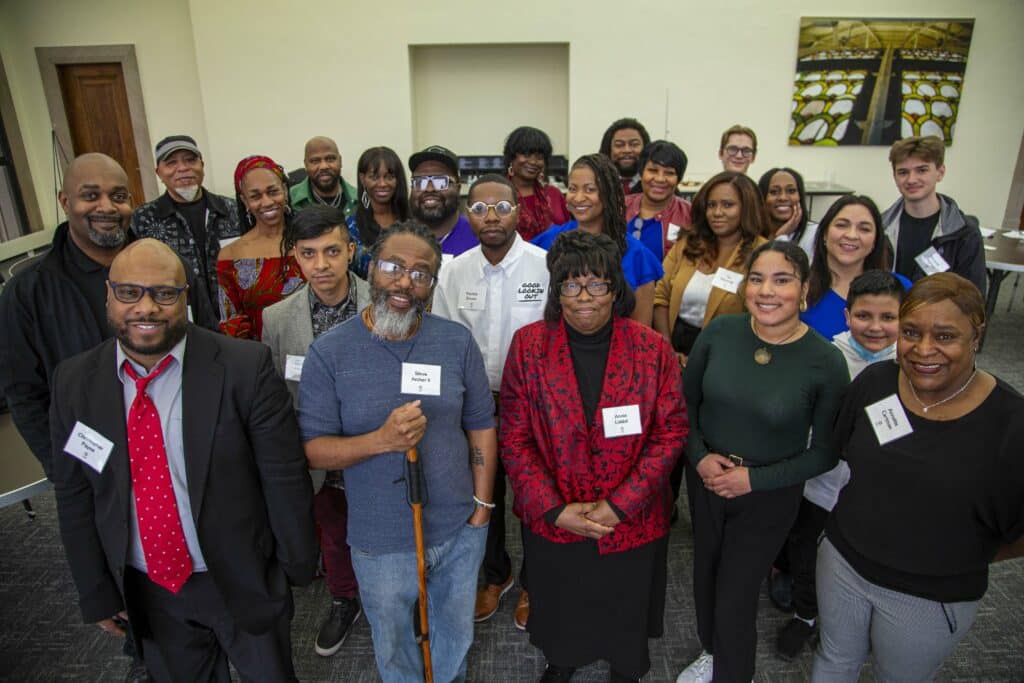
ABOUT GATHER
Peace Fellows participate in GATHER, an online asset-based community engagement course, as well as in-person training, collaborative action projects, and networking experiences with civic leaders, academic researchers, and policy makers. The Chicago Peace Fellows reduce violence by building relationships, engaging youth, collaborative peace building projects over the summer and by creating new networks among residents, families, schools, and nonprofit organizations.
The Fellows are learning together through GATHER, which is both a mobile platform for shared learning and a curriculum for people who want to build on the talents of their neighbors and the assets of their communities to make real and lasting change. Gather Fellows learn and work together through an innovative curriculum that comes pre-loaded on a tablet device with all the connectivity, materials, videos, practices and tools necessary to provide a mobile classroom and toolkit for community leadership.
The Chicago Peace Fellows project connects and equips cohorts of past grantees of the Chicago Fund for Safe and Peaceful Communities to reduce violence and promote peace. The 2024 Chicago Peace Fellows is the sixth all-Chicago cohort to utilize the GATHER platform, an online learning hub built by the Goldin Institute to empower grassroots leaders.
The Chicago Peace Fellows will engage in a 30-week course of intensive shared learning as well as group projects, culminating in a graduation event in November, 2024. The curriculum has been designed in collaboration with the grantees themselves, based on their practical knowledge and hard earned wisdom, with input from a wide range of civic leaders. Fellows will reflect on their past summer work, identify successes and lessons learned, and improve their abilities by sharing strengths and learning new skills.
The Goldin Institute and the Partnership for Safe and Peaceful Communities have aligned missions that value authentic community leadership. The Chicago Fund is uniquely effective at finding motivated problem-solvers and community-builders. By connecting Chicago leaders through GATHER, their efforts to nurture safer and more peaceful communities will be more effective, interconnected and lasting.
OUR PARTNERS
A special thanks to the Chicago Community Trust, the Conant Family Foundation, the Frankel Family Foundation, the MacArthur Foundation, the Polk Bros. Foundation, the Racial Justice Pooled Fund, the Seabury Family Foundation, and the Partnership for Safe and Peaceful Communities for making this program possible.
To follow along the learning journey with the Chicago Peace Fellows, please sign up for our newsletter and follow up on Twitter, Facebook and Instagram.
Meet the 2023 Goldin Global Fellows English Language Cohort
by Yusuph Masanja, Co-Facilitator, Goldin Global Fellows
The Goldin Institute is proud to introduce the 2023 Goldin Global Fellows (English Language Cohort)!
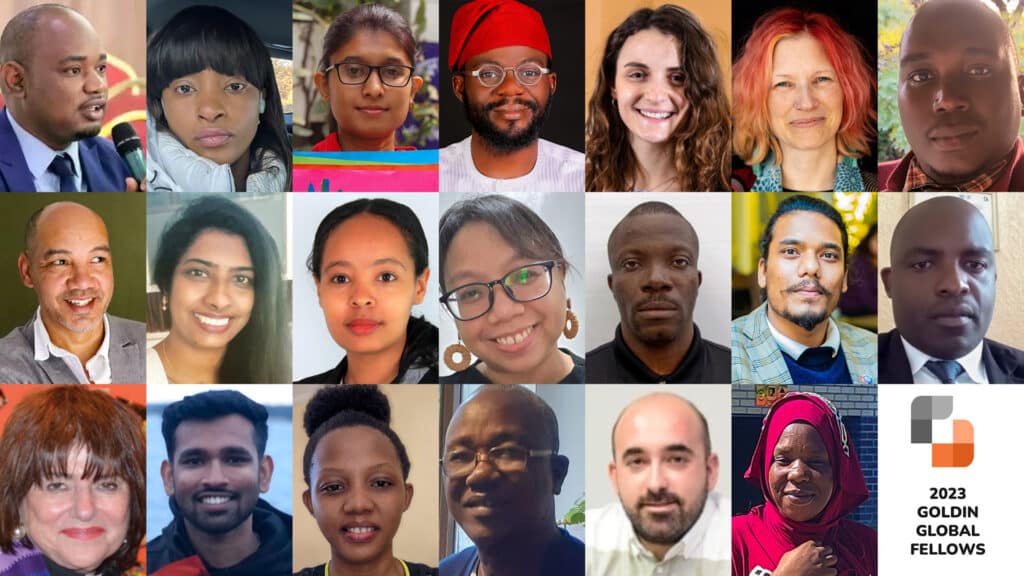
We invite you to learn about each of the outstanding Goldin Global Fellows who live and work in Albania, Bangladesh, Burundi, Cameroon, Ethiopia, India, Kosovo, Malawi, Mali, Nepal, Nigeria, the Philippines, Senegal, South Africa, Sri Lanka, Tanzania, the United States and Zimbabwe. This diverse group of fellows will learn and work together as a Community of Practice, building on the talents of their neighbors and the assets of their communities to make real and lasting change around the world.
ABOUT GATHER
The Fellows are learning together through GATHER, which is both a mobile platform for shared learning and a curriculum for people who want to build on the talents of their neighbors and the assets of their communities to make real and lasting change. Gather Fellows learn and work together through an innovative curriculum that comes pre-loaded on a tablet device with all the connectivity, materials, videos, practices and tools necessary to provide a mobile classroom and toolkit for community leadership.
The Goldin Global Fellows connects and equips grassroots leaders across the world to lead community driven social change. The 2023 Goldin Global Fellows is the fifth international cohort to utilize the GATHER platform, an online learning hub built by the Goldin Institute to empower grassroots leaders. They will engage in a 22-week course of intensive shared learning as well as group projects, culminating in a graduation event in Fall 2023. The curriculum has been designed and refined in collaboration with the Fellows themselves, based on their practical knowledge and hard earned wisdom, with input from a wide range of civic leaders.
To follow along the learning journey with the Goldin Global Fellows, please sign up for our newsletter and follow up on Twitter, Facebook and Instagram.
Meet the 2023 Chicago Peace Fellows
by Travis Rejman, Executive Director
The Goldin Institute invites you to learn about each of our 2023 Chicago Peace Fellows representing 14 community areas across the city. Founded in 2019 in collaboration with the Partnership for Safe and Peaceful Communities, the Chicago Peace Fellows program is the only leadership development program that is built by and for grassroots community leaders on the South and West sides of Chicago.

ABOUT GATHER
Peace Fellows participate in GATHER, an online asset-based community engagement course, as well as in-person training, collaborative action projects, and networking experiences with civic leaders, academic researchers, and policy makers. The Chicago Peace Fellows reduce violence by building relationships, engaging youth, collaborative peace building projects over the summer and by creating new networks among residents, families, schools, and nonprofit organizations.
The Fellows are learning together through GATHER, which is both a mobile platform for shared learning and a curriculum for people who want to build on the talents of their neighbors and the assets of their communities to make real and lasting change. Gather Fellows learn and work together through an innovative curriculum that comes pre-loaded on a tablet device with all the connectivity, materials, videos, practices and tools necessary to provide a mobile classroom and toolkit for community leadership.
The Chicago Peace Fellows project connects and equips cohorts of past grantees of the Chicago Fund for Safe and Peaceful Communities to reduce violence and promote peace. The 2023 Chicago Peace Fellows is the fifth all-Chicago cohort to utilize the GATHER platform, an online learning hub built by the Goldin Institute to empower grassroots leaders.
The Chicago Peace Fellows will engage in a 22-week course of intensive shared learning as well as group projects, culminating in a graduation event in September 2022. The curriculum has been designed in collaboration with the grantees themselves, based on their practical knowledge and hard earned wisdom, with input from a wide range of civic leaders. Fellows will reflect on their past summer work, identify successes and lessons learned, and improve their abilities by sharing strengths and learning new skills.
The Goldin Institute and the Partnership for Safe and Peaceful Communities have aligned missions that value authentic community leadership. The Chicago Fund is uniquely effective at finding motivated problem-solvers and community-builders. By connecting Chicago leaders through GATHER, their efforts to nurture safer and more peaceful communities will be more effective, interconnected and lasting.
OUR PARTNERS
A special thanks to the Chicago Community Trust, the Conant Family Foundation, Crown Family Philanthropies, the Frankel Family Foundation, the MacArthur Foundation, the Polk Bros. Foundation, the Racial Justice Pooled Fund, the Seabury Family Foundation, and the Partnership for Safe and Peaceful Communities for making this program possible.
To follow along the learning journey with the Chicago Peace Fellows, please sign up for our newsletter and follow up on Twitter, Facebook and Instagram.
Celebrating the 2022 Chicago Peace Fellows Graduation
By Jamika Smith, Tina Gulley-Augustus, Don Williams, Jacqueline Williams, and Cree Noble
On September 29th, 2022, 14 grassroots leaders from across Chicago gathered at the Chicago History Museum to celebrate their achievements as the fourth cohort to graduate in the Chicago Peace Fellows program.
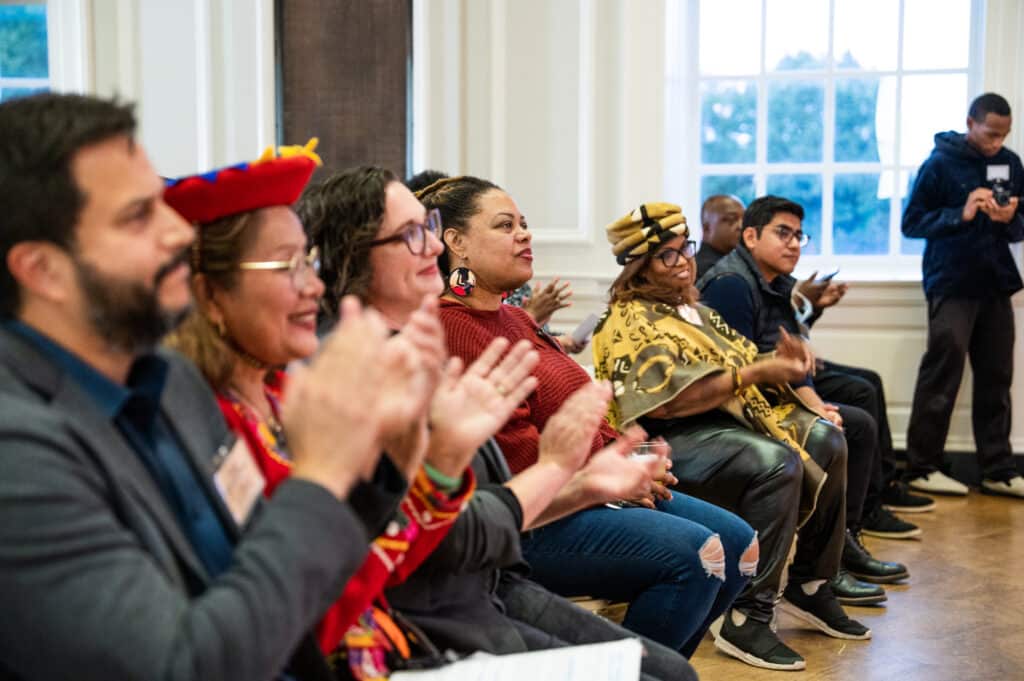
The Chicago Peace Fellows (CPF) program spanned over six months with over 25 workshops, partnership meetings, and discussions that helped Peace Fellows to deepen their shared understanding of grassroots leadership, violence prevention and community driven social change.
“Some of the greatest learning experiences were the collaboration of the Peace Fellows in developing community asset maps and recognizing how rich our communities look when we viewed them from an asset standpoint instead of a deficit. Our communities are so rich in knowledge, resources, and talents.” -- Tina Gulley Augustus, 2022 Chicago Peace Fellow
This was the second year that the Chicago Peace Fellows Graduation was hosted at the Chicago History Museum. The space was filled with laughter, cocktails, hors d'oeuvres, and music by a performance from a youth band from Segundo Ruiz Belvis Cultural Center playing Caribbean Jazz. The balcony gallery, just before you enter the great hall, was lined with pictures of the 2022 Peace Fellows. The gallery is named after the late Mrs. Josephine Baskin Minow, a community organizer, and advocate, who fought for many years for social justice and equal rights, to improve the quality of life for others much like the Chicago Peace Fellows.
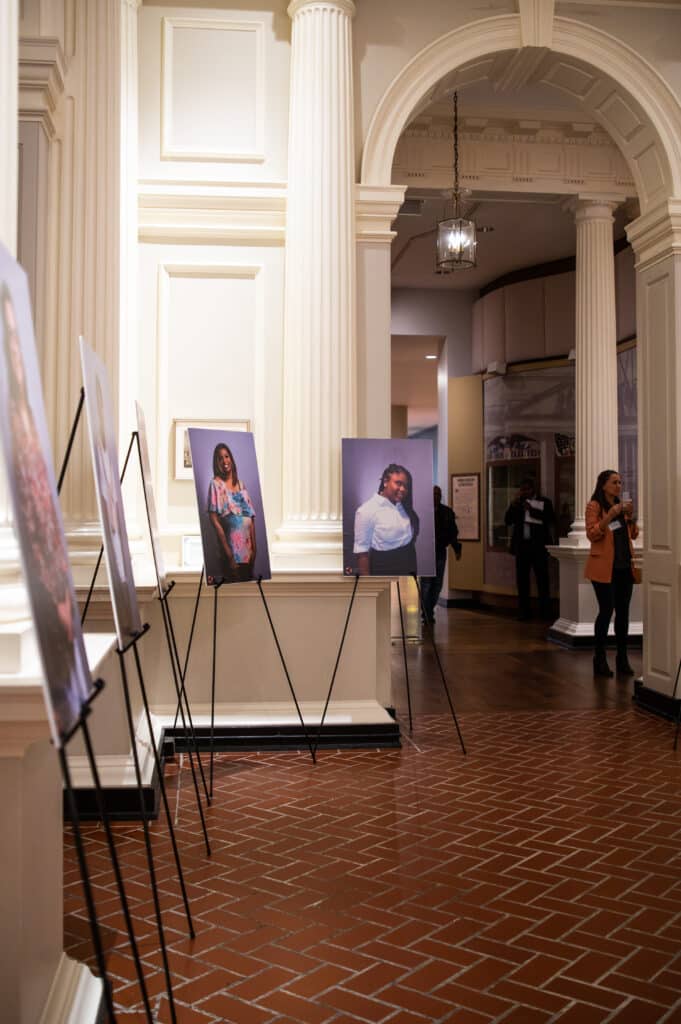
The graduation program was created by the Fellows to highlight their experiences, learnings and accomplishments. They incorporated personal testimonies, group facilitation, spoken word, asset mapping, and interactive programs into the design of the agenda. These activities were chosen due to the influence they had on each Fellow and how they allowed us to connect to our communities, family, and friends who were all in attendance at the graduation ceremony.
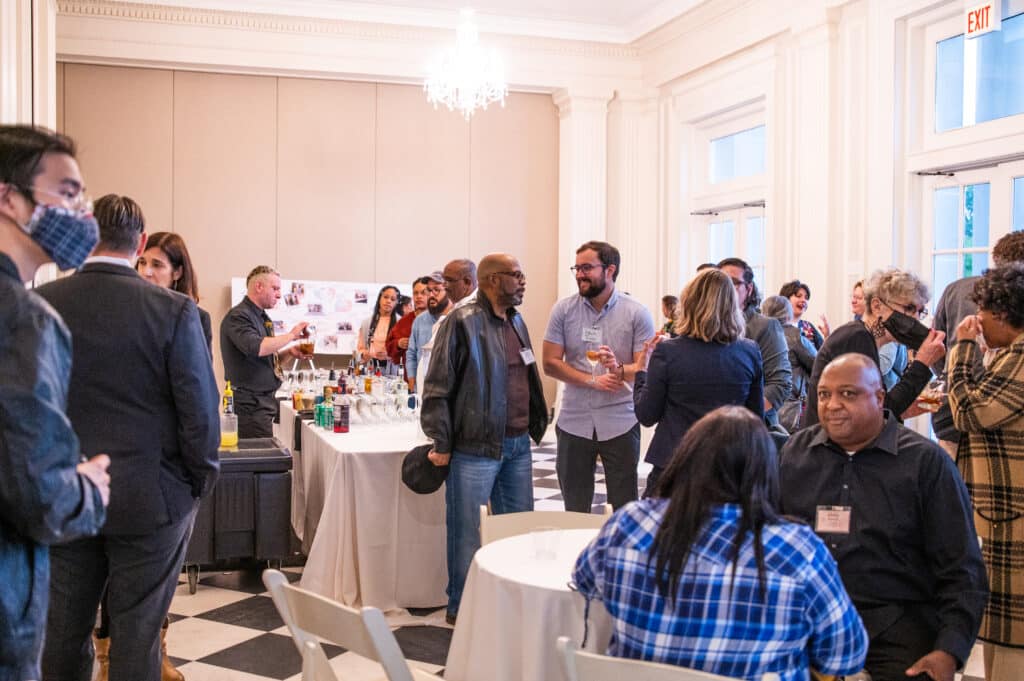
The ceremony began with a welcome remark from the Director of the Chicago Peace Fellows, Burrell Poe, who spoke about the impressive effort, work and conversations this group of fourteen leaders had undertaken over the past five months. Following Burrell, Fellow Lindsey Joyce opened the space with a prayer and reflection. After this opening reflection, Chicago poet Brynn Baltimore offered a powerful spoken word piece performance. The fourth speaker was CPF Don Williams, who provided a personal testimony about the loss of his son and how he had turned pain into purpose.
“My tribute to my son Deon J. Williams left me with a lot of mixed emotions about March 9, 2019… getting up there speaking about it brings some comfort and steps of me getting some closure. Deon was my baby. I wish things would have been different that day and that he would still be here. But that is why I started the Deon J. Williams Foundation, so that I could bring some awareness to juvenile law to change. I want to give a special thanks to my newfound family, the Peace Fellows. Thanks for allowing me to share my story. I hope I can impact someone.” - Don Williams (2022 Chicago Peace Fellows)
After Don’s powerful testimony, all 2022 CPF joined on stage to introduce themselves and the community they serve, and answer the question: “If violence disappeared tomorrow, what would be possible in my neighborhood?”, group presentation which was led by 2022 CPF Syliva Del Raso. Once the Fellows had shared their answers, they invited the audience to contribute to the question by writing it on a sticky note and placing it on a poster board.
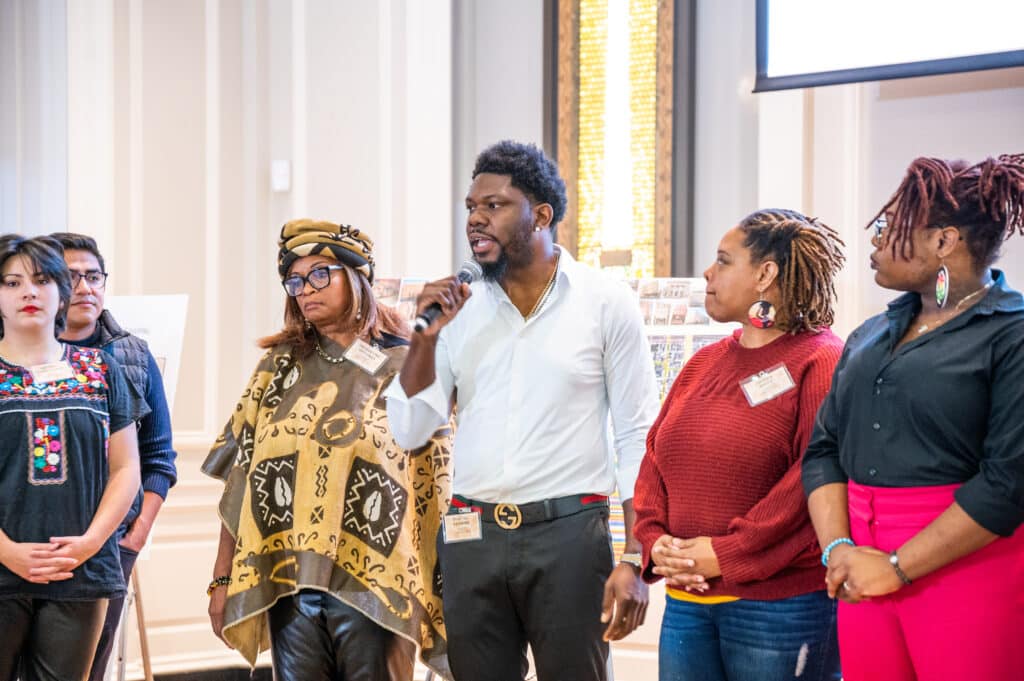
The second part of the ceremony was an explanation and presentation of what asset maps were. Fellows presenting their asset maps included Maria Pike (representing Pilsen), Edwin Martinez, and Sylvia Del Raso (representing Little Village), and Jackie Williams, Jamika Smith, Xochtil Hubbell-Fox, and Tina Gulley-Augustus (representing Austin).
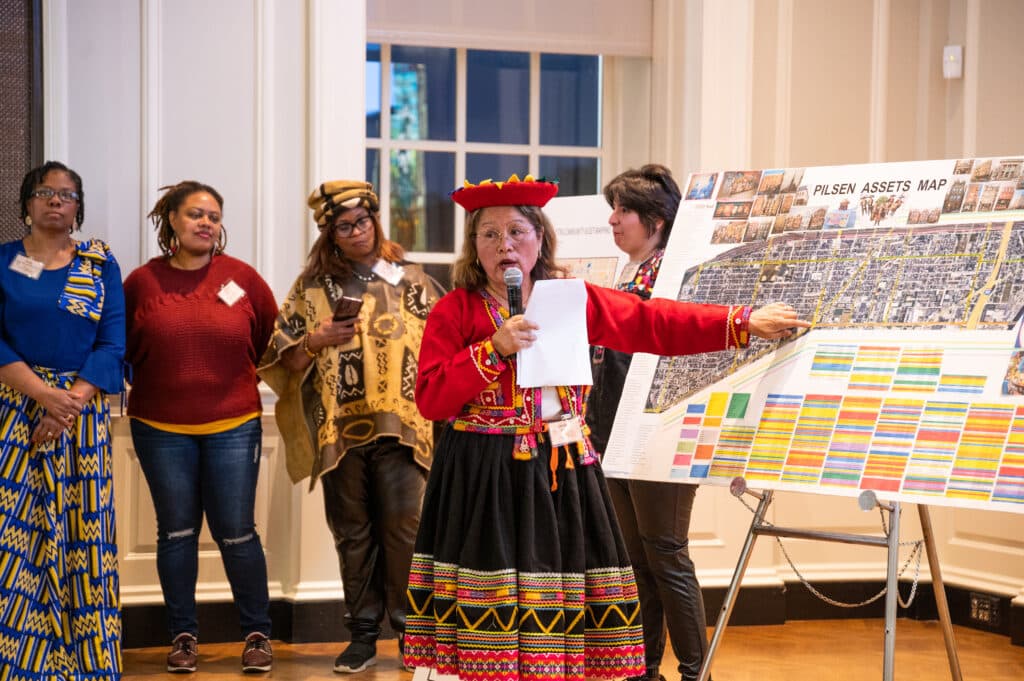
Then CPF Pha’Tal Perkins and CPF Edwin Martinez made closing reflections on what they hope to accomplish as they put their new learnings into practice. Lastly, Jamika Smith unveiled a project she wanted to gift to the 2022 Chicago Peace Fellows.
"Because I gained so much from the overall experience, my Spirit moved me to return the favor by sharing with my cohort and the Goldin Institute leadership a little piece of my heart. I took a skilled craft that has been around since the Middle Ages and I metaphorized it -- did I just make up a word? My cohort and I took an old worn-out chair and told our story, addressing the question “If violence disappeared tomorrow, what would be possible in my neighborhood?” One by one, we discussed the challenges, barriers, and limited beliefs our neighborhoods are struggling with today. Next, I asked them to share with me, if violence was rid from our communities tomorrow how would you feel? And what image and color will represent that feeling for you? After gathering all 18 responses I incorporated them into a design that represented the voices of our 2022 Chicago Peace Fellows. Our Peace Chair will always be an attribute of our journey together. My goal is to take our peace chair on tour in 2023, giving each Peace Fellow the opportunity to house it for a period of time in their organization, as a reminder that we are all connected and still have work to do…Together!” - Jamika Smith (2022 Chicago Peace Fellow).
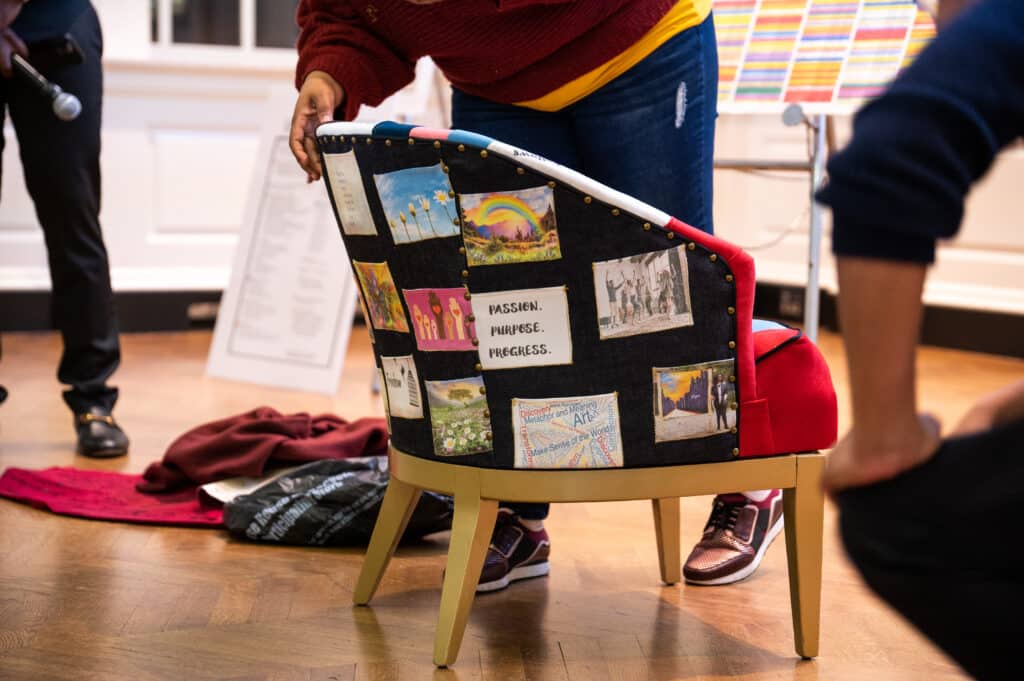
Upon graduation, the 2022 Chicago Peace Fellows now join the Goldin Institute’s Global Alumni Network which consists of over 150 Fellows from over 40 countries around the world. 2022 Chicago Peace Fellows Jacqueline Williams says “I plan to continue to stay in touch with as many people as possible. I have really enjoyed talking and connecting with everyone!
Our 2022 Global Fellow graduates are stronger together
By Yusuph Masanja, Co-Facilitator of the Global Alumni Network

Since the inaugural cohort of the Goldin Global Fellows in 2018, the Goldin Institute has evolved the GATHER curriculum to remove barriers to access for grassroots leaders and to augment the pedagogy to work for the realities of our Fellows across the globe. One such development was the ability for Fellows to access the curriculum not only on iPads but on any internet-enabled device or smart phone which is most convenient for them. This change removes a significant barrier for Fellows who reside in remote places and lack reliable access to electricity, wifi and the latest gadget or repair services.
As a Facilitator of the program, our intentionality in removing barriers is why I am such an advocate of the GATHER approach. It is how our network of Alumni has grown to 150 Fellows from diverse backgrounds, including those leaders who are often left out of conferences or trainings, who now hail from over 40 countries. And we are confidently making space for more grassroots leaders to join us. The Community of Practice that Fellows continue to build, one cohort at a time, is proof that building change from the assets we have is a path to meaningful and inclusive progress.
This year we saw our third cohort of Fellows embark on the Global Fellows Program. The 2022 Goldin Global Fellows are 14 bold and wise grassroots leaders from across the globe, including Cote d'Ivoire, North Macedonia, the USA, Ghana, Nigeria, Zimbabwe, Nepal, Pakistan, Malawi, Bangladesh, Albania, Sierra Leone, and Kenya. Amidst our diversity, we are united by the desire to learn, reflect and implement proven ideas for community-driven social change in our respective countries.
At the graduation ceremony on 4th November, the 2022 Fellows demonstrated their achievements and shared their aspirations. The ceremony began with a message to all Fellows from the Founder and Board Chair of the institute, Diane Goldin who warmly welcomed the new Fellows to the network:
“I could not be more honored to have the opportunity to know so many talented leaders and know the innovative results. My congratulations for all your work in achieving your goals and for being a part of our global family. You are appreciated and loved.” - Diane Goldin
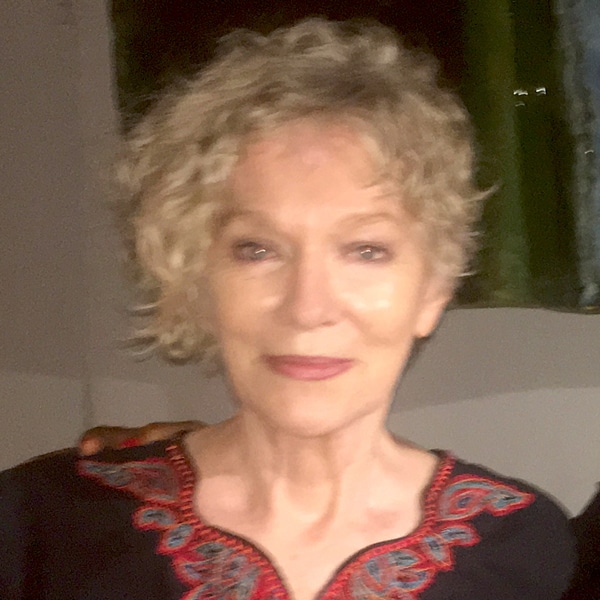
At the graduation, Fellows shared moving testimonies of how their five months through the program transformed their worldviews, their grassroots activism, and brought new friends into their lives. As a Facilitator, this feedback is so rewarding, which keeps me motivated to expand the opportunity for even more community leaders around the world. Here are a few quotes from some Fellows captured from the graduation ceremony:
"The process of assets mapping where we identified people, institutions, connections -- and all things which give us life in our communities -- helped us to see the abundance of resources that can be tapped to make progress." - Abdul Rahman Kowa from Sierra Leone.
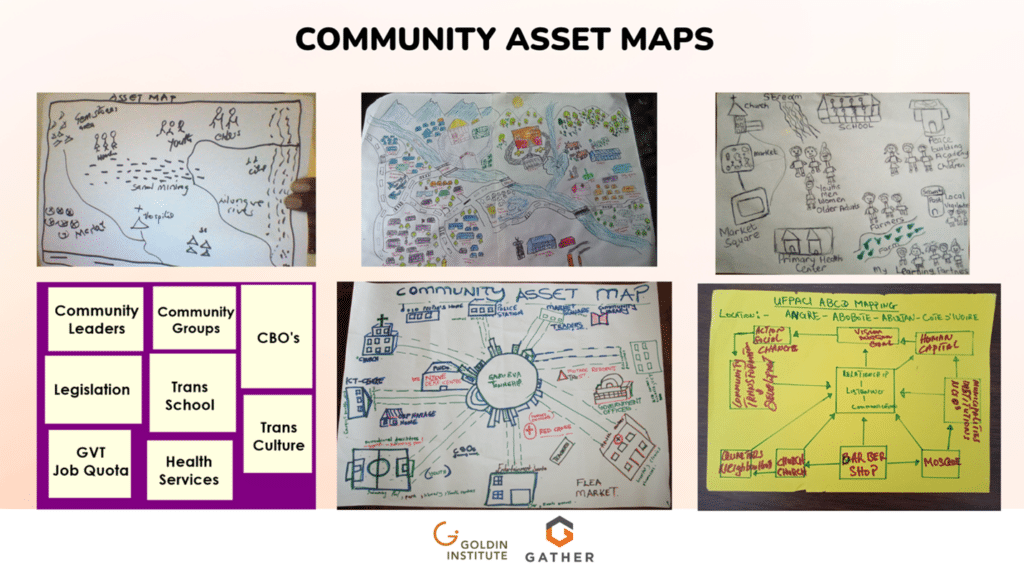
Florence Adhiambo from Kenya shared a great insight from what she learned during the program:
"The GATHER curriculum reminded me that leadership is not a position, but rather a commitment to building partnerships and trust with our fellow community members where everyone is aware that everyone has something to contribute."
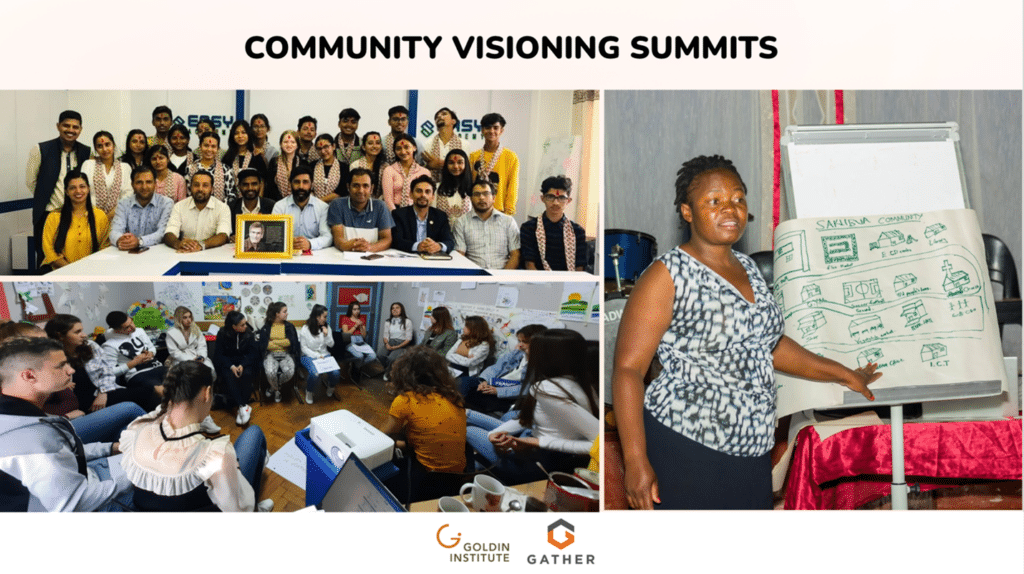
A key element of the curriculum on the GATHER Platform is the hosting of Community Visioning Summits; these allowed Fellows to share assets they have identified with broader community members, and to use appreciative inquiry to discover aspirations and shared priorities with the community. Central to the GATHER curriculum is the capacity for grassroots leaders to involve the voices of those most often left out in regular community processes and actively remove barriers to full participation.
In addition to sharing what they learned, Fellows shared key aspirations and next steps for how to collaborate with neighbors and global peers. In one example, Global Fellow Klementina Dobrevska from North Macedonia shared her next steps for addressing the issue of bullying and violence in schools:
Students who have disabilities are faced with a lot of pressure and bullying. Now we are working to promote children’s rights. So far, we have 500 students on board and in our second Community Visioning Summit we managed to leverage a new tool for youth participation which will allow us to get students’ opinions across the country.
As a final step in the Program, all Fellows partnered with their community members to develop a vision and outline next steps they will take to bring these aspirations to their respective countries. We will be sharing Fellows progress with you in the second edition of this article so that you can better understand and support their efforts. We believe everyone can make a difference no matter how small!
In addition to Fellows sharing their wisdom during the ceremony, they also performed poems, and songs, and led a candlelight ceremony. You can watch the entire recording of the graduation ceremony here.
Before closing, our Executive Director Travis Rejman, virtually presented the Graduation Certificates to each Fellow recognizing their successful completion of the GATHER curriculum and invited them to the Global Alumni Network. Staff members shared their messages of congratulations for the Fellows and Travis Rejman closed the ceremony with the following remarks:
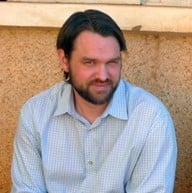
“It’s been an honor to learn together with you over these past 20 weeks. Over the last 20 years, we have been inspiring, connecting, and equipping grassroots leaders around the world so that they can learn from each other and work together to tackle really tough issues that all of our communities are facing. This celebration is a perfect example of what this work looks like in the real world. Thank you all for your dedication and hard work. We are very proud to stand with you and celebrate your accomplishments. We are very excited to welcome you into our global family.” — Travis Rejman.
Celebrating 20 years of grassroots leadership and social change
By Jassi K. Sandhar, Global Research Fellow
It is very rare to find organizations like the Goldin Institute. As an employee of the Institute, I promise this is not a biased opinion. Having worked in the non-profit sector for 12 years, being involved in various social justice and human rights projects, the Goldin Institute has stood out as an organization which embodies principles of justice, fairness, equity, and kindness both within the Institute itself and in the work we do.
The importance of adopting grassroots approaches in social justice work is becoming increasingly recognized, but the approach taken by the Goldin Institute over the past two decades goes beyond that. It is grassroots-led and embedded in compassion, kindness and learning, from everyone but most especially those closest to the issues. We promote the voices of those often excluded who have the most at stake in making progress and ensure that they have leadership roles in every social change movement. Which is why it is extremely exciting to celebrate 20 years of the Goldin Institute.
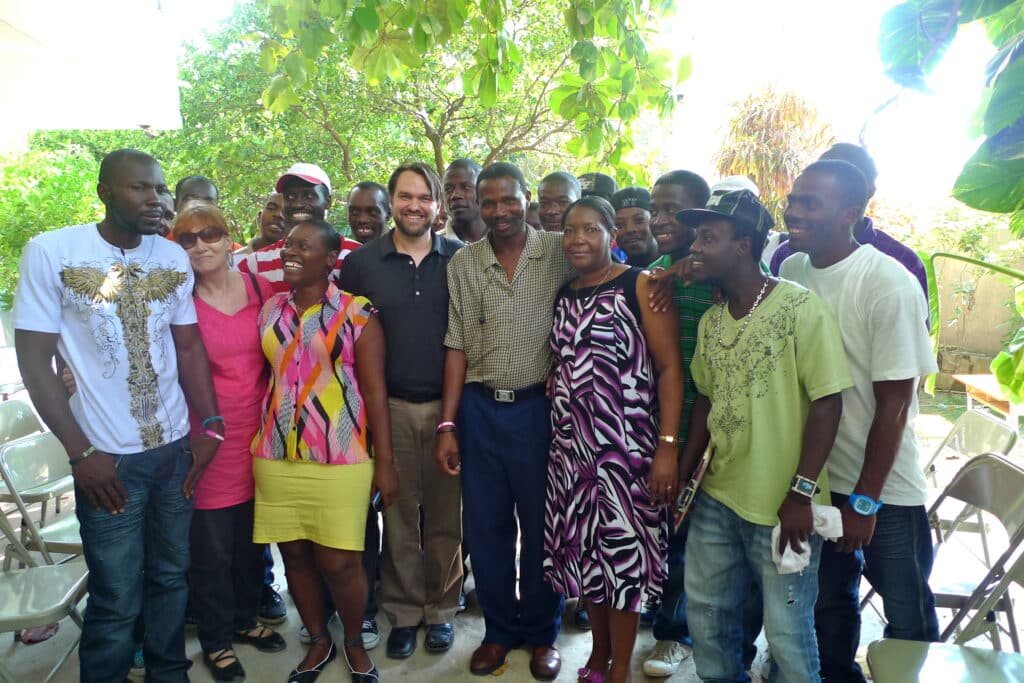
Our commitment to community-driven social change was foundational from our very inception. In October 2002, grassroots leaders from over 25 cities around the world convened in Chicago to learn from each other to collaboratively determine the mission, values and strategy of what became the Goldin Institute. The Goldin Institute was born through this conversation as an enduring platform to provide grassroots community organizers with tools and support they need to build meaningful partnerships within and between their cities. Fast forward to today, the Institute has expanded its reach to 150 Alumni leading change in 40 countries (and growing)!
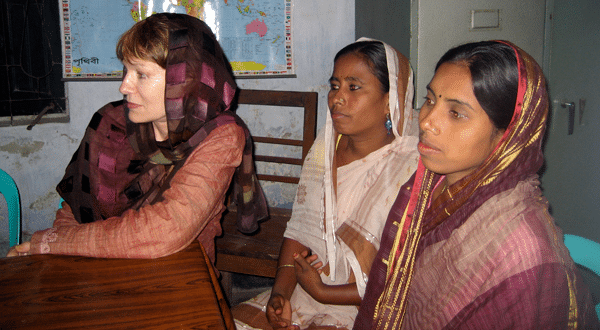
The last 20 years have taken us on an inspiring and incredible journey. We have worked with grassroots leaders in over 50 countries on issues such as:
- Child Soldier Reintegration in Uganda: In the discussions about disarmament, demobilization and reintegration of children used as soldiers in the conflict in Northern Uganda, the voices and perspectives of former child soldiers have too long been ignored. Former child soldiers themselves led a ground-breaking oral testimony process by interviewing over 150 of their peers and together reflecting on common concerns and shared aspirations that led to the creation of YOLRED, the first reintegration and support organization designed and run by former child soldiers.
- Addressing the Water Crisis in the Philippines: In war-torn Mindanao, over 70% of the population lacks reliable access to safe drinking water. Through the leadership of Global Associate Susana Anayatin and her team, over 40,000 people now have access to safe water in the region through the installation of water wells at over 140 local schools. In addition to providing a critical resource, this project brings together all sides of the conflict who are working together to “win the peace”.
- Tackling Gender-Based Violence in Haiti: Since the January 2010 earthquake in Haiti, women and girls living in the internally displaced persons camps face alarming rates of rape and other forms of gender-based violence. Through the leadership of Global Associate Malya Villard’s and KOFAVIV, men have joined the movement to provide security and advocacy to end all forms of gender-based violence in Haiti.
- Improving Microcredit in Bangladesh: The current global debate about the efficacy of microfinance is marked by the absence of those who have most at stake in the controversy: loan recipients. The Goldin Institute worked with partner organization Nijera Kori to lift up these voices, most often marginalized women, and restore their perspectives, insights and aspirations to the discussion, leading to the return of indigenous community support systems and greater regulation of the microfinance industry in Bangladesh.
- Mutual Aid Collaborative in Chicago, USA: Today, Chicago is stained by an enduring legacy of racial injustice that is laid bare by the disproportionate impact of the twin pandemics of violence and COVID-19 on our communities on the South and West sides of Chicago. In response, the Chicago Peace Fellows launched the Mutual Aid Collaborative as a model of the structural changes they seek, practicing a model of shared leadership, collaborative decision-making and collective action.
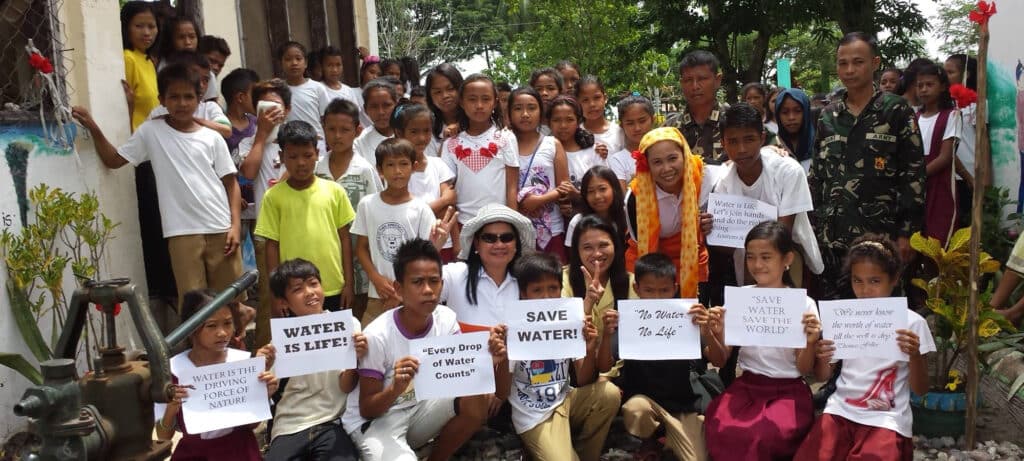
In 2018 we made significant strides in facilitating a global network of community leaders through launching GATHER, a tablet-based mobile learning tool to empower communities of practice. GATHER allows peers to learn, work and reflect together using practical tools. That same year, the Institute launched the Global Fellows program, an international cohort of 20 Fellows who collaborated with one another through a progression of learning about new theories of community engagement, practicing these ideas in their own areas, and reflecting together as a global community of practice.
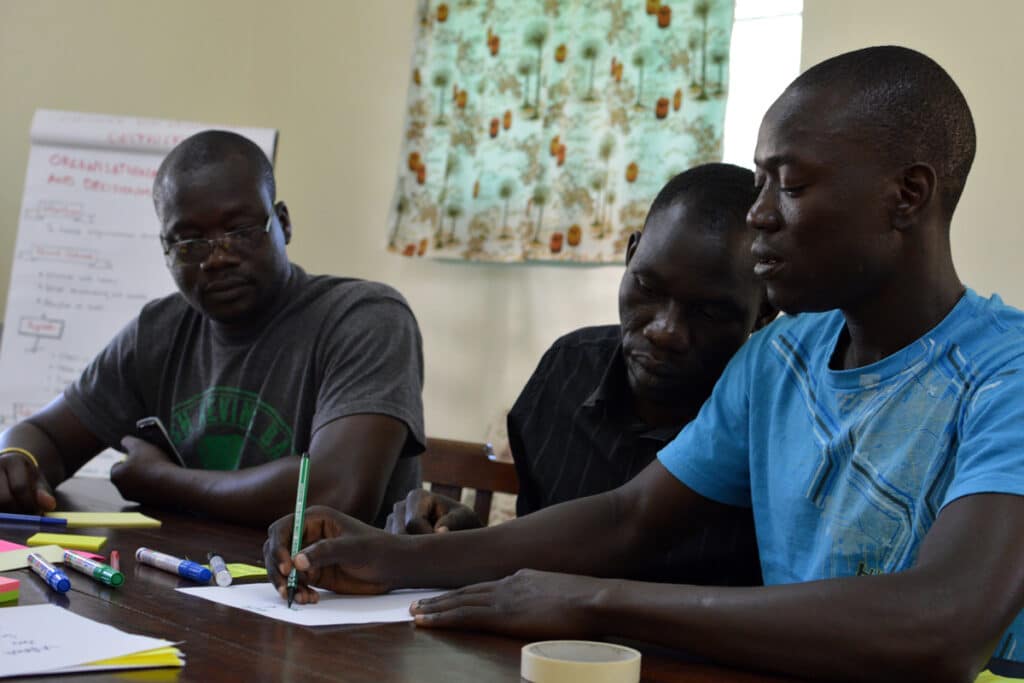
The success of the 2018 pilot has seen the GATHER course run annually with the Chicago Peace Fellows program and the Global Fellows program and, to date, we have trained 150 grassroots leaders in 40 countries in the GATHER curriculum. These grassroots leaders are local community or civil society leaders and practitioners, and represent a diverse group of backgrounds, ages, genders, and locations, and work on a range of pressing and urgent social justice issues. We are excited to continue this international Fellows program and excited to see what we can achieve together in the next 20 years.
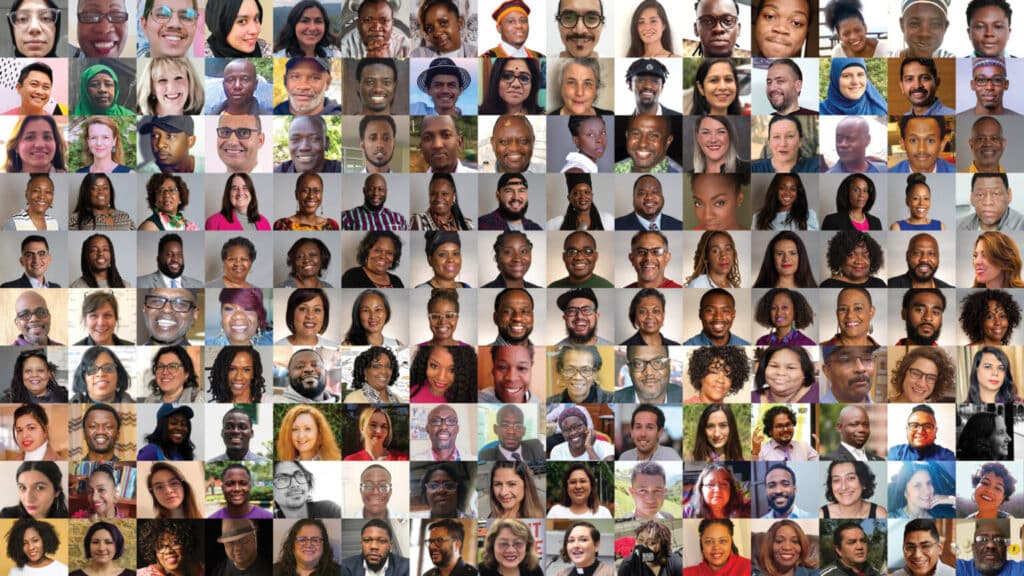
We thank you for sharing the last 20 years with us; we are particularly thankful for the continued commitment of our supporters who have stood beside us and ensured the vital work of our global network continues.
“Malya Villard Appolon, the founder of KOFAVIV (women's commission of victims for victims in Haiti), wishes the Goldin Institute a happy 20th anniversary for the good work it is doing around the world. It is because of the Goldin institute that KOFAVIV still exists today. It is still helping women who are suffering from tragic violence under armed gangs who are doing violence in all forms especially sexual violence that does not give chance to neither women nor girls. I will never regret that day Goldin Institute came our way. I am very proud of the Goldin Institute. I urge all organizations in the world to support Goldin to continue to bring change to the most vulnerable people within the Haitian society and other global communities. Thank you.” - (Malya Villard Appolon, Global Associate from Haiti).
Mobilizing a Community Clean Up in Liberia
By John Kamma, Global Fellow from Liberia
Whatever social innovation we are concerned with, our impact on the lives of the people we serve or work with matters. Implementing their good ideas is important to achieving our collective goal. And, this was the case with our intervention in the Glass Factory Community in Gardnersville, Liberia.

Glass Factory was an industrial zone before the Liberian civil war began in December 1989. Internally displaced persons and returnee refugees took advantage in the absence of the industry owners and settled there in droves, and after seeking Government permission were permitted to settle in the area as squatters. Resultantly, no one owns a land deed; instead the local authority apportioned the land temporarily amongst persons seeking occupation of it. Given this situation, more people got attracted to the land (as it is cheaper than living on a titled land deed) which has led to it becoming densely populated. This has put much pressure over the limited land space, and led to inappropriate management and disposal of waste into drainages, resulting in excessive pollution and health hazards.

With the funding received from the Collective Campaign, and to address these issues of pollution and its implication on the community’s health, on February 19 2022 we had a day of community cleaning, focusing on drainages in “Glass Factory”, with strong displays of support from the community. During the clean-up exercise, we spoke to the conscience of community residents, using a megaphone, about the health benefits of keeping the drainages clean and the importance of protecting them from getting clogged up, and how essential that is for the wellbeing of all residents.

The community appreciates our organization, the Citizens Bureau for Development and Productivity in Liberia, and our supporters for working with the community in such a meaningful and impactful way, that is heart touching. Community leaders and elders were so encouraged that they formed part of the cleanup team; choosing to be with the cleanup team in their neighborhood rather than doing nothing, they joined voluntarily. We are delighted the day’s clean-up went very well.

This endeavour implemented real community driven social change by using the Asset Based Community Development (ABCD) approach, which builds on local talents and skills, and recognizes that those experiencing a social problem are those who need tobe involved in the decision-making processes when devising solutions. In Glass Factory, following such conversations the community member identified that throwing plastic bags and waste in drainages creates clogging which results in increased pollution and mosquitoes, with the likelihood of people getting sick. In relation to the above, residents of Glass Factory community held a conversation to find a way forward in handling these social challenges and to attend to the community drainages. They were successfully able to maximize tools, including wheel-barrow, shovels, ricks, booths, etc for an effective clean up exercise.
The volunteers committed to turning up with their own tools and equipment, and gathered for a team meeting in which they discussed actions to be taken, to effectively work on community drainages that will promote residents' health, sanitation and wellbeing. We, at the Citizens Bureau for Development and Productivity with the kind and good will gesture of our generous donors through the 2021 Goldin Global Fellow Collective Fund are addressing the social challenges posed with clog drainages by working with those close to the problem, supporting their aspirations to realize the community driven social change they so desire.

We are very grateful to #GATHER and the #GoldinInstitute for helping us 2021 Goldin Global Fellows to have acquired the skills and the resources to lead community driven social change. It is truly exciting to see this learning into practice.
Caught between Two Wars

Over the past four years, I have painfully witnessed my country of Cameroon be ravaged by a steadily escalating war which has displaced thousands of civilians internally, and into neighboring countries. As the president of Community Green Engagement (COMGREEN), I and my colleagues have strived to ensure the communities which we serve not only have sustainable access to food, but also engage communities on existential climate change issues.

In the current period, we have been forced to watch, helpless to prevent the entire destruction of villages because of the fighting. Many flee to places such as Bamenda, where Community Green Engagement has its headquarters. run to the major towns like bamenda where we have our headquarters. Unrelenting gunfire and the sincere risk of interpersonal violence by warring groups makes it nearly impossible for us to work.

Further, due to the deadly clashes which have mostly been in the rural areas, farmers and ranchers have abandoned their properties leading to drastic food shortages. Now, the consequences of the COVID-19 pandemic are upon us as well. Though we have few confirmed cases of virus infection, like too many countries throughout Africa and around the world we struggle with rigorous medical testing for the disease. Additionally, the police and military are seizing the opportunity offered by the pandemic to further restrict civilian movement by enacting curfews, and deep fines for those who are outside of their home without official permission, or subjectively valid reasons. Some have been beaten for these reasons as well.
With the support of the Goldin Institute. Community Green Engagement is launching a FaceBook fundraising drive to secure foodstuffs and livestock for Bamenda and the surrounding areas we serve.

It is a very difficult time for us here in Cameroon, but Community Green Engagement continues to offer resources, training and hope. Before the fighting in Cameroon, between Anglophone and Francophone factions, COMGREEN maintained a beekeeping project, gardening, and oversaw the construction of a community center through regular civilian-focused consultations, Many stakeholders came together to discuss our most pressing problems and collectively come up with solutions. We pray the time will come again soon when we can resume such inspiring outcomes, again.
Click Here to Support the Community in Cameroon
Responding to COVID-19 in the Bedouin Community

As a minority group within Israel, the Bedouin Community has had a long history of strife in dealings with the Israeli government. During these dire times of Covid-19 the government has failed in many areas to support Negev Bedouins through funds resources and information. As a result many families have been facing unemployment, health and communication concerns. Students who do not have computers can’t do school from home households with over ten people are having trouble with social distancing and unrecognized villages are unable to maintain a sanitized environment due to limited water.
A New Dawn in the Negev has been taking action in three areas:
- Established an emergency Covid-19 Hotline for receiving calls from those in need of urgent care and assistance;
- Proactive outreach through our call-center, managed by our staff and volunteers, to reach out to those that might feel apprehensive or afraid to cross social norms; and
- Building an online platform, still in process, that will generate opportunities to share initiatives, hold discussions and promote peer to peer volunteer ideas.
Through all these approaches we provide both structural and culturally-sensitive opportunities to express their needs and find responses based on solidarity.

[quote]A New Dawn is actively involved in the fight against Covid-19, and our work is effective because we have trust and local knowledge earned over years of experience working with vulnerable communities.[/quote]
We are more than happy to share our knowledge and experiences and coach other organizations who are facing similar situations and obstacles with social-governmental tensions. By working together, we can become stronger and more equipped for our work indivually and collectively. A New Dawn in the Negev is always seeking new connections for resource building and sharing.
A New Dawn’s biggest obstacle now is infrastructure and resources for our current endeavors. We’re working on a phone switchboard, computer tablets, hot line operating software and other activities, as well as an Internet platform via WhatsApp to build online community, and subscribing to an existing platform while adapting to the specific needs of the Bedouin company and training a limited team of operators.

We need to urgently respond to this crisis today, but we also have to rethink our work for the future.
Even before the coronavirus hit our community, our organization was often short on resources, facing neglect from the government, and having to deal with already high unemployment rates and poverty. Now the Coronavirus has given us no choice but to quadruple our efforts and prioritize our programs. We have to safeguard our infrastructure and make it adaptable to the new social norms of social distancing. Before the crisis, meeting people and engaging with them was paramount. Now, we have to apply all our work to a virtual world.
For our community as a whole, the crisis has impacted our way of life and culture. Now more than ever, cultural competency plays a role in the future of our people; we must not forget who we are.
During this time, we have grown virtually connected with our world more than ever before. Our experiences are in need of being shared to others through this heightened medium of communication. Connecting to my network of Global Fellows is critical in this time of physical isolation and the Goldin Institute is definitely one of our greatest partners. We wish to strengthen our ties with all the alumni and otherpartners to build a better future together.
READ MORE:
- https://fathomjournal.org/fighting-back-against-covid-19-in-the-bedouin-community/
- https://www.makorrishon.co.il/news/213227/
- www.b7net.co.il
- https://www.facebook.com/watch/?v=218873629470984
The Promise and Peril of Working with Governments: A Global Gather/Chicago Peace Fellows' Roundtable
Last month, Jamal Alkirnawi and Lo Ivan Castillon led a discussion on March 16 for Global Gather and Chicago Peace Fellows entitled “The Promise and Peril of Working with Governments,” about the challenges and opportunities non-governmental organizations (NGOs) can face when seeking to partner with states, and local officials.
Both members of the inaugural Global Gather cohort from last summer, Jamal Alkirnawi leads New Dawn in the Desert, a Bedouin-Jewish organization in Negev Desert, while Lo Ivan Castillon is based in Cotabato City in the province of Maguindanao in the Philippines. Lo Ivan is a Peace Program Officer in the Office of the Presidential Adviser on the Peace Process.

At the outset of the conversation, space was created for attendees from around the world to share updates and personal feelings about the emerging, world-wide COVID-19 pandemic and its impact in their respective communities. Many were still adjusting to government-sanctioned “shelter-in-place” orders and the reality of physically distancing in crowded areas.
Jamal led the conversation with a detailed, highly informed PowerPoint presentation entitled “Head-On with the Governor.” In it, he identified three primary models of NGO engagement with governmental entities: 1) Nonprofits as supplements to government; 2) Nonprofits and government as complements; and, 3) Nonprofits and government as adversaries. While offering concrete, sometimes personal examples of the challenges and downsides of NGO-government relationships, Jamal was careful to highlight the upsides for both sides if certain frameworks principles are adhered. As he noted, NGOs may often be at odds with elected officials and government agencies over resources, influence, strategic approaches to shared challenges, but they don’t have to be. He pointed out what he sees as the “Four C’s” of NGO-Government Relations, including cooperation, complementarity, co-optation, and confrontation, with the first two being the preferred frameworks on which engagement should be built.
As a “Peace Program Officer” in the Office of the Presidential Adviser on the Peace Process, Lo Ivan is well equipped to speak from the perspective of governmental agencies’ experience with NGOs. He’s also worked closely with Global Gather Fellow Susana Anyatin on creating access to clean water in the most rural, isolated areas of the Philippines and understand the stresses on community-based efforts.
